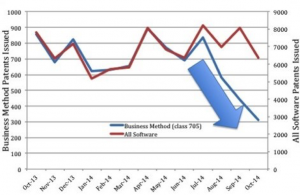Life after Alice: software patents under scrutiny
Ever since the US Supreme Court announced its decision in the Alice Corp. v. CLS Bank International case in 2014, the fate of software patents remained uncertain. Alice Corp.’s patents were invalidated, and the court’s statement included the following telling passages:
“A mere instruction to implement an abstract idea on a computer “cannot impart patent eligibility.””
“The mere recitation of a generic computer cannot transform a patent-ineligible abstract idea into a patent-eligible invention.”
“Stating an abstract idea while adding the words “apply it” is not enough for patent eligibility.”
“Nor is limiting the use of an abstract idea to a particular technological environment.”
The Alice ruling, widely seen as having broad implications, led to a sharp decrease in granted software patents, in particular those referring to business methods. This can be seen in the graph below. There was even some discussion on whether the US courts are taking the EPO route as regards software patents.
A more recent ruling, however, brings a new hope to all those invested in software patents. In May 2016, the Federal Circuit ruled that two patents relating to databases are valid, reversing a previous decision of a lower court to invalidate them under Alice. The patents, belonging to Enfish LLC and used in an infringement case against Microsoft Corp., have been reinstated. The Federal Circuit reasoned that unlike in the Alice case, where an abstract idea was simply used in a certain technological environment, the Enfish database patents are patent-eligible, as they refer to improving the functioning of a computer. The Federal Circuit wrote “Accordingly, we find that the claims at issue in this appeal are not directed to an abstract idea within the meaning of Alice. Rather, they are directed to a specific improvement to the way computers operate,”. Even more generally, the court stated “we do not read Alice to broadly hold that all improvements in computer-related technology are inherently abstract”.
Only time will show how this Federal Circuit ruling will be interpreted in the general context of US software patents and whether Alice’s impact will be reduced. As for the infringement case, the Federal Circuit conceded that Microsoft did not violate one of the Enfish’s claims. The case will proceed further.




